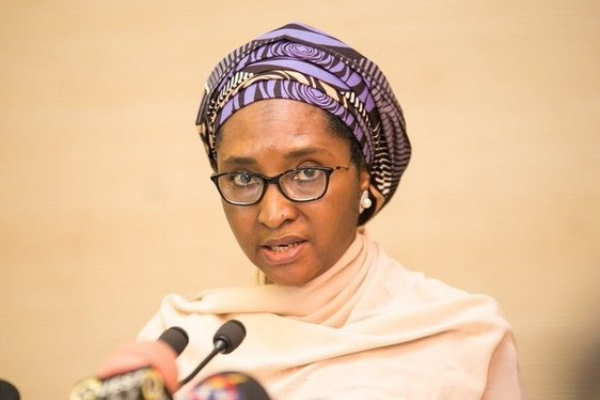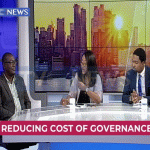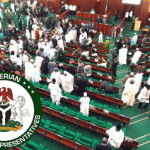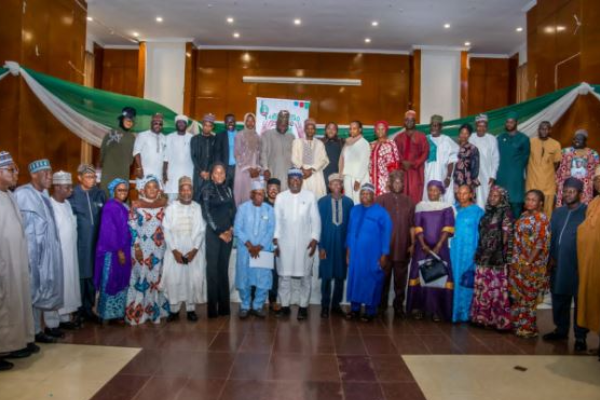Nigeria will require approximately $2.3 trillion to bridge its infrastructure deficits over the next 21 years, this is according to the Minister of Finance, Budget, and National Planning, Hajiya Zainab Ahmed.
According to her, the revised National Integrated Infrastructure Master Plan is intended to fund key economic sectors such as power, rail, roads, housing, and agriculture from 2022 to 2043.
[wonderplugin_video iframe=”https://youtu.be/9sD9lPGgXek” lightbox=0 lightboxsize=1 lightboxwidth=960 lightboxheight=540 autoopen=0 autoopendelay=0 autoclose=0 lightboxtitle=”” lightboxgroup=”” lightboxshownavigation=0 showimage=”” lightboxoptions=”” videowidth=600 videoheight=400 keepaspectratio=1 autoplay=0 loop=0 videocss=”position:relative;display:block;background-color:#000;overflow:hidden;max-width:100%;margin:0 auto;” playbutton=”https://www.tvcnews.tv/wp-content/plugins/wonderplugin-video-embed/engine/playvideo-64-64-0.png”]
“In the national development plan, we have cost the investment that is required; $2.3 trillion with a private sector contribution of 86 per cent anticipated between 2021 to 2025.
“These are downturn investment targets, but they represent the baseline requirements to build a modern Nigeria, an industrialised nation that we deserve for ourselves and also for our future generation,” the minister said while speaking at a conference on the Integrated Infrastructural Research for Development in Abuja Friday.
The minister further observed that extensive consultation with the private sector had created an innovative approach to financing infrastructure projects.
Ahmed said, “the Road Infrastructure Development and Refurbishment Investment Tax Credit Scheme launched in 2019 leverages private sector expertise to construct repair and maintain critical federal roads.
“We started the Road Infrastructure Development and Refurbishment Investment Tax Credit Scheme launched in 2019 to leverage private sector capital via tax credits, and provide private sector expertise to construct, repair and maintain critical road infrastructure in key economic growth corridors and industrial clusters in Nigeria.
“With this project, the road projects have been approved and are at various stages of construction to the use of tax credit to finance the rehabilitation and reconstruction of road projects across six geopolitical zones of our country.
“So far, we have issued four circles of SUKUK bonds totaling N64.5 billion, and there’s a fifth circle that is under preparation that will be worth about N250 billion. This is what we have issued so far and deployed for specific road projects across the country.”
Vice President Yemi Osinbajo had in August 2022, said the nation, with the of the private sector, needed $2.3 trillion to fix its infrastructure gap.
Nigeria will require approximately $2.3 trillion to bridge its infrastructure deficits over the next 21 years, this is according to the Minister of Finance, Budget, and National Planning, Hajiya Zainab Ahmed.
According to her, the revised National Integrated Infrastructure Master Plan is intended to fund key economic sectors such as power, rail, roads, housing, and agriculture from 2022 to 2043.
[wonderplugin_video iframe=”https://youtu.be/9sD9lPGgXek” lightbox=0 lightboxsize=1 lightboxwidth=960 lightboxheight=540 autoopen=0 autoopendelay=0 autoclose=0 lightboxtitle=”” lightboxgroup=”” lightboxshownavigation=0 showimage=”” lightboxoptions=”” videowidth=600 videoheight=400 keepaspectratio=1 autoplay=0 loop=0 videocss=”position:relative;display:block;background-color:#000;overflow:hidden;max-width:100%;margin:0 auto;” playbutton=”https://www.tvcnews.tv/wp-content/plugins/wonderplugin-video-embed/engine/playvideo-64-64-0.png”]
“In the national development plan, we have cost the investment that is required; $2.3 trillion with a private sector contribution of 86 per cent anticipated between 2021 to 2025.
“These are downturn investment targets, but they represent the baseline requirements to build a modern Nigeria, an industrialised nation that we deserve for ourselves and also for our future generation,” the minister said while speaking at a conference on the Integrated Infrastructural Research for Development in Abuja Friday.
The minister further observed that extensive consultation with the private sector had created an innovative approach to financing infrastructure projects.
Ahmed said, “the Road Infrastructure Development and Refurbishment Investment Tax Credit Scheme launched in 2019 leverages private sector expertise to construct repair and maintain critical federal roads.
“We started the Road Infrastructure Development and Refurbishment Investment Tax Credit Scheme launched in 2019 to leverage private sector capital via tax credits, and provide private sector expertise to construct, repair and maintain critical road infrastructure in key economic growth corridors and industrial clusters in Nigeria.
“With this project, the road projects have been approved and are at various stages of construction to the use of tax credit to finance the rehabilitation and reconstruction of road projects across six geopolitical zones of our country.
“So far, we have issued four circles of SUKUK bonds totaling N64.5 billion, and there’s a fifth circle that is under preparation that will be worth about N250 billion. This is what we have issued so far and deployed for specific road projects across the country.”
Vice President Yemi Osinbajo had in August 2022, said the nation, with the of the private sector, needed $2.3 trillion to fix its infrastructure gap.
Nigeria will require approximately $2.3 trillion to bridge its infrastructure deficits over the next 21 years, this is according to the Minister of Finance, Budget, and National Planning, Hajiya Zainab Ahmed.
According to her, the revised National Integrated Infrastructure Master Plan is intended to fund key economic sectors such as power, rail, roads, housing, and agriculture from 2022 to 2043.
[wonderplugin_video iframe=”https://youtu.be/9sD9lPGgXek” lightbox=0 lightboxsize=1 lightboxwidth=960 lightboxheight=540 autoopen=0 autoopendelay=0 autoclose=0 lightboxtitle=”” lightboxgroup=”” lightboxshownavigation=0 showimage=”” lightboxoptions=”” videowidth=600 videoheight=400 keepaspectratio=1 autoplay=0 loop=0 videocss=”position:relative;display:block;background-color:#000;overflow:hidden;max-width:100%;margin:0 auto;” playbutton=”https://www.tvcnews.tv/wp-content/plugins/wonderplugin-video-embed/engine/playvideo-64-64-0.png”]
“In the national development plan, we have cost the investment that is required; $2.3 trillion with a private sector contribution of 86 per cent anticipated between 2021 to 2025.
“These are downturn investment targets, but they represent the baseline requirements to build a modern Nigeria, an industrialised nation that we deserve for ourselves and also for our future generation,” the minister said while speaking at a conference on the Integrated Infrastructural Research for Development in Abuja Friday.
The minister further observed that extensive consultation with the private sector had created an innovative approach to financing infrastructure projects.
Ahmed said, “the Road Infrastructure Development and Refurbishment Investment Tax Credit Scheme launched in 2019 leverages private sector expertise to construct repair and maintain critical federal roads.
“We started the Road Infrastructure Development and Refurbishment Investment Tax Credit Scheme launched in 2019 to leverage private sector capital via tax credits, and provide private sector expertise to construct, repair and maintain critical road infrastructure in key economic growth corridors and industrial clusters in Nigeria.
“With this project, the road projects have been approved and are at various stages of construction to the use of tax credit to finance the rehabilitation and reconstruction of road projects across six geopolitical zones of our country.
“So far, we have issued four circles of SUKUK bonds totaling N64.5 billion, and there’s a fifth circle that is under preparation that will be worth about N250 billion. This is what we have issued so far and deployed for specific road projects across the country.”
Vice President Yemi Osinbajo had in August 2022, said the nation, with the of the private sector, needed $2.3 trillion to fix its infrastructure gap.
Nigeria will require approximately $2.3 trillion to bridge its infrastructure deficits over the next 21 years, this is according to the Minister of Finance, Budget, and National Planning, Hajiya Zainab Ahmed.
According to her, the revised National Integrated Infrastructure Master Plan is intended to fund key economic sectors such as power, rail, roads, housing, and agriculture from 2022 to 2043.
[wonderplugin_video iframe=”https://youtu.be/9sD9lPGgXek” lightbox=0 lightboxsize=1 lightboxwidth=960 lightboxheight=540 autoopen=0 autoopendelay=0 autoclose=0 lightboxtitle=”” lightboxgroup=”” lightboxshownavigation=0 showimage=”” lightboxoptions=”” videowidth=600 videoheight=400 keepaspectratio=1 autoplay=0 loop=0 videocss=”position:relative;display:block;background-color:#000;overflow:hidden;max-width:100%;margin:0 auto;” playbutton=”https://www.tvcnews.tv/wp-content/plugins/wonderplugin-video-embed/engine/playvideo-64-64-0.png”]
“In the national development plan, we have cost the investment that is required; $2.3 trillion with a private sector contribution of 86 per cent anticipated between 2021 to 2025.
“These are downturn investment targets, but they represent the baseline requirements to build a modern Nigeria, an industrialised nation that we deserve for ourselves and also for our future generation,” the minister said while speaking at a conference on the Integrated Infrastructural Research for Development in Abuja Friday.
The minister further observed that extensive consultation with the private sector had created an innovative approach to financing infrastructure projects.
Ahmed said, “the Road Infrastructure Development and Refurbishment Investment Tax Credit Scheme launched in 2019 leverages private sector expertise to construct repair and maintain critical federal roads.
“We started the Road Infrastructure Development and Refurbishment Investment Tax Credit Scheme launched in 2019 to leverage private sector capital via tax credits, and provide private sector expertise to construct, repair and maintain critical road infrastructure in key economic growth corridors and industrial clusters in Nigeria.
“With this project, the road projects have been approved and are at various stages of construction to the use of tax credit to finance the rehabilitation and reconstruction of road projects across six geopolitical zones of our country.
“So far, we have issued four circles of SUKUK bonds totaling N64.5 billion, and there’s a fifth circle that is under preparation that will be worth about N250 billion. This is what we have issued so far and deployed for specific road projects across the country.”
Vice President Yemi Osinbajo had in August 2022, said the nation, with the of the private sector, needed $2.3 trillion to fix its infrastructure gap.
Nigeria will require approximately $2.3 trillion to bridge its infrastructure deficits over the next 21 years, this is according to the Minister of Finance, Budget, and National Planning, Hajiya Zainab Ahmed.
According to her, the revised National Integrated Infrastructure Master Plan is intended to fund key economic sectors such as power, rail, roads, housing, and agriculture from 2022 to 2043.
[wonderplugin_video iframe=”https://youtu.be/9sD9lPGgXek” lightbox=0 lightboxsize=1 lightboxwidth=960 lightboxheight=540 autoopen=0 autoopendelay=0 autoclose=0 lightboxtitle=”” lightboxgroup=”” lightboxshownavigation=0 showimage=”” lightboxoptions=”” videowidth=600 videoheight=400 keepaspectratio=1 autoplay=0 loop=0 videocss=”position:relative;display:block;background-color:#000;overflow:hidden;max-width:100%;margin:0 auto;” playbutton=”https://www.tvcnews.tv/wp-content/plugins/wonderplugin-video-embed/engine/playvideo-64-64-0.png”]
“In the national development plan, we have cost the investment that is required; $2.3 trillion with a private sector contribution of 86 per cent anticipated between 2021 to 2025.
“These are downturn investment targets, but they represent the baseline requirements to build a modern Nigeria, an industrialised nation that we deserve for ourselves and also for our future generation,” the minister said while speaking at a conference on the Integrated Infrastructural Research for Development in Abuja Friday.
The minister further observed that extensive consultation with the private sector had created an innovative approach to financing infrastructure projects.
Ahmed said, “the Road Infrastructure Development and Refurbishment Investment Tax Credit Scheme launched in 2019 leverages private sector expertise to construct repair and maintain critical federal roads.
“We started the Road Infrastructure Development and Refurbishment Investment Tax Credit Scheme launched in 2019 to leverage private sector capital via tax credits, and provide private sector expertise to construct, repair and maintain critical road infrastructure in key economic growth corridors and industrial clusters in Nigeria.
“With this project, the road projects have been approved and are at various stages of construction to the use of tax credit to finance the rehabilitation and reconstruction of road projects across six geopolitical zones of our country.
“So far, we have issued four circles of SUKUK bonds totaling N64.5 billion, and there’s a fifth circle that is under preparation that will be worth about N250 billion. This is what we have issued so far and deployed for specific road projects across the country.”
Vice President Yemi Osinbajo had in August 2022, said the nation, with the of the private sector, needed $2.3 trillion to fix its infrastructure gap.
Nigeria will require approximately $2.3 trillion to bridge its infrastructure deficits over the next 21 years, this is according to the Minister of Finance, Budget, and National Planning, Hajiya Zainab Ahmed.
According to her, the revised National Integrated Infrastructure Master Plan is intended to fund key economic sectors such as power, rail, roads, housing, and agriculture from 2022 to 2043.
[wonderplugin_video iframe=”https://youtu.be/9sD9lPGgXek” lightbox=0 lightboxsize=1 lightboxwidth=960 lightboxheight=540 autoopen=0 autoopendelay=0 autoclose=0 lightboxtitle=”” lightboxgroup=”” lightboxshownavigation=0 showimage=”” lightboxoptions=”” videowidth=600 videoheight=400 keepaspectratio=1 autoplay=0 loop=0 videocss=”position:relative;display:block;background-color:#000;overflow:hidden;max-width:100%;margin:0 auto;” playbutton=”https://www.tvcnews.tv/wp-content/plugins/wonderplugin-video-embed/engine/playvideo-64-64-0.png”]
“In the national development plan, we have cost the investment that is required; $2.3 trillion with a private sector contribution of 86 per cent anticipated between 2021 to 2025.
“These are downturn investment targets, but they represent the baseline requirements to build a modern Nigeria, an industrialised nation that we deserve for ourselves and also for our future generation,” the minister said while speaking at a conference on the Integrated Infrastructural Research for Development in Abuja Friday.
The minister further observed that extensive consultation with the private sector had created an innovative approach to financing infrastructure projects.
Ahmed said, “the Road Infrastructure Development and Refurbishment Investment Tax Credit Scheme launched in 2019 leverages private sector expertise to construct repair and maintain critical federal roads.
“We started the Road Infrastructure Development and Refurbishment Investment Tax Credit Scheme launched in 2019 to leverage private sector capital via tax credits, and provide private sector expertise to construct, repair and maintain critical road infrastructure in key economic growth corridors and industrial clusters in Nigeria.
“With this project, the road projects have been approved and are at various stages of construction to the use of tax credit to finance the rehabilitation and reconstruction of road projects across six geopolitical zones of our country.
“So far, we have issued four circles of SUKUK bonds totaling N64.5 billion, and there’s a fifth circle that is under preparation that will be worth about N250 billion. This is what we have issued so far and deployed for specific road projects across the country.”
Vice President Yemi Osinbajo had in August 2022, said the nation, with the of the private sector, needed $2.3 trillion to fix its infrastructure gap.
Nigeria will require approximately $2.3 trillion to bridge its infrastructure deficits over the next 21 years, this is according to the Minister of Finance, Budget, and National Planning, Hajiya Zainab Ahmed.
According to her, the revised National Integrated Infrastructure Master Plan is intended to fund key economic sectors such as power, rail, roads, housing, and agriculture from 2022 to 2043.
[wonderplugin_video iframe=”https://youtu.be/9sD9lPGgXek” lightbox=0 lightboxsize=1 lightboxwidth=960 lightboxheight=540 autoopen=0 autoopendelay=0 autoclose=0 lightboxtitle=”” lightboxgroup=”” lightboxshownavigation=0 showimage=”” lightboxoptions=”” videowidth=600 videoheight=400 keepaspectratio=1 autoplay=0 loop=0 videocss=”position:relative;display:block;background-color:#000;overflow:hidden;max-width:100%;margin:0 auto;” playbutton=”https://www.tvcnews.tv/wp-content/plugins/wonderplugin-video-embed/engine/playvideo-64-64-0.png”]
“In the national development plan, we have cost the investment that is required; $2.3 trillion with a private sector contribution of 86 per cent anticipated between 2021 to 2025.
“These are downturn investment targets, but they represent the baseline requirements to build a modern Nigeria, an industrialised nation that we deserve for ourselves and also for our future generation,” the minister said while speaking at a conference on the Integrated Infrastructural Research for Development in Abuja Friday.
The minister further observed that extensive consultation with the private sector had created an innovative approach to financing infrastructure projects.
Ahmed said, “the Road Infrastructure Development and Refurbishment Investment Tax Credit Scheme launched in 2019 leverages private sector expertise to construct repair and maintain critical federal roads.
“We started the Road Infrastructure Development and Refurbishment Investment Tax Credit Scheme launched in 2019 to leverage private sector capital via tax credits, and provide private sector expertise to construct, repair and maintain critical road infrastructure in key economic growth corridors and industrial clusters in Nigeria.
“With this project, the road projects have been approved and are at various stages of construction to the use of tax credit to finance the rehabilitation and reconstruction of road projects across six geopolitical zones of our country.
“So far, we have issued four circles of SUKUK bonds totaling N64.5 billion, and there’s a fifth circle that is under preparation that will be worth about N250 billion. This is what we have issued so far and deployed for specific road projects across the country.”
Vice President Yemi Osinbajo had in August 2022, said the nation, with the of the private sector, needed $2.3 trillion to fix its infrastructure gap.
Nigeria will require approximately $2.3 trillion to bridge its infrastructure deficits over the next 21 years, this is according to the Minister of Finance, Budget, and National Planning, Hajiya Zainab Ahmed.
According to her, the revised National Integrated Infrastructure Master Plan is intended to fund key economic sectors such as power, rail, roads, housing, and agriculture from 2022 to 2043.
[wonderplugin_video iframe=”https://youtu.be/9sD9lPGgXek” lightbox=0 lightboxsize=1 lightboxwidth=960 lightboxheight=540 autoopen=0 autoopendelay=0 autoclose=0 lightboxtitle=”” lightboxgroup=”” lightboxshownavigation=0 showimage=”” lightboxoptions=”” videowidth=600 videoheight=400 keepaspectratio=1 autoplay=0 loop=0 videocss=”position:relative;display:block;background-color:#000;overflow:hidden;max-width:100%;margin:0 auto;” playbutton=”https://www.tvcnews.tv/wp-content/plugins/wonderplugin-video-embed/engine/playvideo-64-64-0.png”]
“In the national development plan, we have cost the investment that is required; $2.3 trillion with a private sector contribution of 86 per cent anticipated between 2021 to 2025.
“These are downturn investment targets, but they represent the baseline requirements to build a modern Nigeria, an industrialised nation that we deserve for ourselves and also for our future generation,” the minister said while speaking at a conference on the Integrated Infrastructural Research for Development in Abuja Friday.
The minister further observed that extensive consultation with the private sector had created an innovative approach to financing infrastructure projects.
Ahmed said, “the Road Infrastructure Development and Refurbishment Investment Tax Credit Scheme launched in 2019 leverages private sector expertise to construct repair and maintain critical federal roads.
“We started the Road Infrastructure Development and Refurbishment Investment Tax Credit Scheme launched in 2019 to leverage private sector capital via tax credits, and provide private sector expertise to construct, repair and maintain critical road infrastructure in key economic growth corridors and industrial clusters in Nigeria.
“With this project, the road projects have been approved and are at various stages of construction to the use of tax credit to finance the rehabilitation and reconstruction of road projects across six geopolitical zones of our country.
“So far, we have issued four circles of SUKUK bonds totaling N64.5 billion, and there’s a fifth circle that is under preparation that will be worth about N250 billion. This is what we have issued so far and deployed for specific road projects across the country.”
Vice President Yemi Osinbajo had in August 2022, said the nation, with the of the private sector, needed $2.3 trillion to fix its infrastructure gap.














